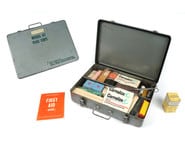Presented by Museum of the Peace Corps Experience and American University Museum
2 2/3 x 13 1/2 x 10 in.
Metal, assorted medical supplies
Collection, Museum of the Peace Corps Experience
Gift of H. James Whitaker, Iran, Sari 1964–66

I was issued the medical kit shortly after my arrival in Iran in early 1964, just prior to being dispatched to my service site—a small town called Fuman near Rasht, the provincial capital of Gilan Province.
I was assigned to the agricultural extension service, which meant many visits to villages. I’d often notice children’s appalling health issues, such as suppurating external infections, burns that weren’t healing, ophthalmic infections, vitamin deficiencies, diarrhea, etc. There was no access to health care for the children—only home remedies, which usually worsened the conditions.
So ignoring Peace Corps Iran policy, which prohibited nonqualified volunteers from rendering medical assistance to local people, I began taking the medical kit with me on village visits. I treated whatever cases I could. I also arranged for leaflets to be printed in the local language explaining the location of minimal government health facilities available to the poor. I distributed these leaflets wherever I traveled.
My rudimentary yet wide-ranging medical services were greatly appreciated and, to my amazement, often effective. (Was it simply a placebo effect?) I quickly exhausted the contents of my medical kit, so I began replenishing them with my own funds, buying medicine at pharmacies in Rasht.
Soon these remedies were exhausted as well, so I appealed for assistance from a wonderfully personable Iranian physician in Rasht who had been enlisted to care for the area’s Peace Corps volunteers. He started providing me with supplies, eventually, and unbeknownst to me, lobbying the Peace Corps physician in Tehran to unofficially ship replenishments for my medical kit. This arrangement continued until I contracted pneumonia and was hospitalized in Rasht’s primitive provincial hospital under the care of that same Iranian physician. Upon my recovery, I was transferred to another province.
With a bit of subterfuge I retained the medical kit when I departed from Iran. (Returning your medical kit was a condition for clearance to depart, but I simply claimed that my kit had been lost.) I included it in my allowed shipment for home.
Amazingly, despite multiple upheavals and the loss of most of my possessions over the decades of my international career, my Peace Corps medical kit somehow passed from one safe haven to another. Upon completing my travels and life as an expatriate, I found this precious kit among stored possessions.
The Committee for a Museum of the Peace Corps Experience is a 501(c)(3) private nonprofit organization. Tax ID: EIN # 93-1289853
The Museum is not affiliated with the U.S. Peace Corps and not acting on behalf of the U.S. Peace Corps.
Museum of the Peace Corps Experience © 2024. All Rights Reserved.